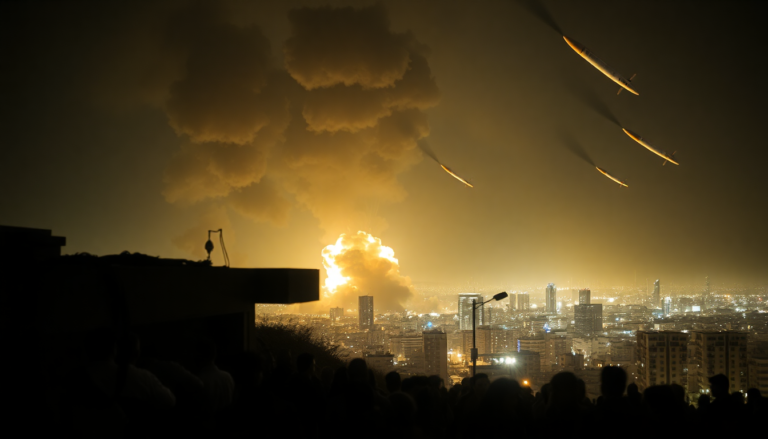Tensions escalate as Iran launches missile strikes on Tel Aviv in retaliation for Israeli attacks on its nuclear sites.

Topics covered
The sky above Tel Aviv exploded with chaos as Iran unleashed a storm of missiles overnight, retaliating against Israeli airstrikes that targeted its nuclear facilities. The attack marks a pivotal moment in the ongoing conflict, with air raid sirens blaring and citizens scrambling for safety in bomb shelters.
This is not just an escalation; it’s a call to arms that reverberates far beyond the borders of Israel and Iran.
The Iranian response and its consequences
As the first missiles pierced the calm of the night, smoke billowed from central Tel Aviv.
The once-bustling city now transformed into a battlefield, with at least one missile reportedly evading the Iron Dome defense system. Casualties quickly mounted, with Israel’s paramedic service reporting 34 injuries, including a woman critically wounded under rubble. In the nearby city of Rishon LeZion, two lives were tragically lost, and 19 others were injured in the chaos.
This wave of aggression from Iran, dubbed Operation Rising Lion, is a direct counter to Israel’s air offensive targeting crucial nuclear sites. Among the casualties of the earlier strikes was Hossein Salami, a senior figure in Iran’s Islamic Revolutionary Guard Corps. The implications of these events are staggering; 78 individuals have died, and over 320 have been injured in Iran according to their ambassador to the UN.
Global reactions and diplomatic tensions
The international community is holding its breath as the situation unfolds. Calls for restraint from leaders like Sir Keir Starmer and US President Donald Trump seem to echo in vain. Starmer, after a Cobra meeting with senior officials, urged Netanyahu to seek a diplomatic resolution. Meanwhile, Trump, on his Truth Social platform, hinted at a potential nuclear deal for Iran, suggesting that the clock is ticking.
“Today is day 61,” Trump stated, referring to an ultimatum he had set for Iran to negotiate a deal. The urgency is palpable, yet the responses from Tehran remain defiant. The Iranian leadership has made it clear that it will not back down in the face of what they perceive as existential threats.
The regional impact of the conflict
As missiles rain down, the implications stretch far beyond the immediate damage. This conflict revives memories of the Iran-Iraq war, a time when both nations suffered immensely. Israel’s Prime Minister Netanyahu warned in a video address, “More is on the way.” His message was a stark reminder of the escalating nature of this confrontation.
The UN Secretary-General Antonio Guterres has demanded an end to the violence, calling for peace and diplomacy. As tensions soar, the prospects for a peaceful resolution seem increasingly remote. The stakes are high, and the world watches closely, wondering how this conflict will reshape the geopolitical landscape.
Amidst the chaos, questions linger: Will diplomacy prevail in the face of such aggression? Can a nuclear deal be salvaged, or is the region hurtling towards a larger confrontation? As the dust settles and the sirens fade, the answers remain elusive, leaving a sense of unease and uncertainty in their wake.




